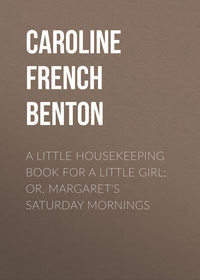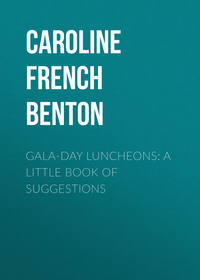 полная версия
полная версияLiving on a Little
"After a few weeks of that sort of thing I made up my mind it would never do. I must be a 'lady help,' even though there was no one to help but Dick. So I changed my plans of work and got some especial gowns, and I have kept to a sort of uniform like this ever since, to my infinite satisfaction. If you look me over carefully you may discover the points I had in mind when I planned it."
Dolly looked. "I see," she said, slowly. "Elbow sleeves, to keep from rolling them up; and a little square Dutch neck just below the collar line, so you won't have to wear a collar; and a short, full skirt, just off the floor; and the color, my dear, – and here you show your feminine vanity, – a most becoming blue!"
"I hope so," said Mary, not at all abashed. "I like to have becoming clothes, even in the kitchen. But you did not say a word of the material; all my working things are ginghams or some sort of wash goods. Then they are all in one piece, and trimmed with plain bias bands edged with a fold of white, or some similar contrivance. I put an apron on when I do kitchen work and try and keep the dresses clean as long as I can, and when they are soiled put them right in the tub, and they take no time to do up. And, by the way, they are not all this pretty color. I have still more serviceable ones of dark navy blue, and others of striped gray and white, like a nurse's dress; but I am thankful to say they are all pretty and all becoming, and far neater in every way than my shirt-waist and skirt used to be."
"Do you wear the same thing summer and winter?"
"No; in summer I have thin things, lawns and dimities and organdies, but they are all made like this. Even my dress-up summer things are apt to be, too, because I like the fashion and it never 'goes out,' as other fashions do."
"But you don't wear this uniform at dinner. At least you change every afternoon now to a more or less dress-up frock. Is that for my benefit? Do you wear these gowns when you are alone?"
"No, never. I always put on a fresh and pretty gown after my lunch dishes are put away and my dinner all ready but heating it up or doing the last necessary cooking. Then I spend the afternoon like a lady of leisure. At dinner-time I put a mammoth long-sleeved apron on and go out in the kitchen and finish up as I am; I take off my apron before the dinner is served, too. If I have to carry out plates and wait, as of course I do when we are alone, then I have a really pretty little white apron I slip on; but I will look as nice as I can at my own dinner-table."
"And spill the greasy dish-water around the edge of the dress, as you did before?"
"Never again; I learned my lesson at that time. No, my dresses clear the ground all around; that had to be so, to my regret, because I love a long gown for dinner, but I will not pin up a train at the back with a safety-pin, as so many do, nor will I wear things soiled. I have them just a tiny bit off the floor, and put on the big apron. As to the dish-water, Dolly, to let you into an awful secret which would make our New England grandmother turn in her grave, I never do any dishes at night; that is part of the lesson I told you I had mastered. I just clear the table, scrape the things and pile them in the big dish-pan, with some very hot water and a little soap powder, and there they repose till morning. I tidy the kitchen and dining-room in about three minutes, and that is all I do. Then I take off my apron and go into the parlor, rested and ready to spend the evening with my husband."
"Do you never set the breakfast-table at night?"
"No; it does not take any time to do it in the morning, and, as I tell you, I will not do a single unnecessary thing at night. Then I have more important things to think of; books to read and friends to see and a husband to entertain. I am in earnest, Dolly. That is all a part of learning how to manage to keep a home as well as a house."
"I certainly shall never learn enough to marry on, I see that. But tell me more while we are on this subject. How do you have such a pretty table all the time and still economize in everything, including time and strength? I should think it would take both money and labor to keep up as you do."
"To speak with seriousness still, then, I am convinced most girls make a great mistake when, after having had pretty things all their lives, they marry on a small income and one by one give up their dainty little ways of doing. Sometimes they put everything on the table at once at dinner; sometimes they have a tablecloth that has seen better days; sometimes they dispense with a fern-dish, or stop cleaning the silver. I call it all bad management. One can keep up the traditions of niceness just as easily as to dispense with them, and to my mind it is false economy to let down. If you must have plain food, it tastes better, and I believe it nourishes you more, if it is set out attractively. No, Dolly, never give up using your pretty dishes and doilies, and keep your silver and glass bright, and learn to do it so easily that it is a matter of course, and it will never be the last straw that reduces you to nervous prostration, as some women believe. Ugly things, soiled and broken things, and careless living, are far more likely to wear out your nerves than trifles such as I am telling you to attend to."
"But as to details, Mary. Take your breakfast and lunch-table; there are those doilies, always clean and white, and your pretty blue and white china. How about the laundress's bills and the cost of the dishes?"
"There is no economy, to my thinking, greater than is found in using doilies, to begin with. I put them on as you see, always, for two meals. When one gets mussed or gets a spot on it I wash it out when I do my dishes; I have an iron on and press it as soon as it dries, right here in the kitchen, and it is ready for next time. When they all need a regular boiling, I put a set in the weekly wash, and the laundress does them in far less time than she would a tablecloth. For dinner of course I do use a cloth, but having it on only once a day it lasts a week, and there is but one in the wash instead of two or three, as there would be otherwise. If a spot comes on this I rub it out in a hand-basin and stretch the cloth out smoothly on the table and leave it to dry; then if it is rough, I put on an iron for a moment. Of course I should not use a soiled cloth under any circumstances."
"And the china?"
"That is just cheap blue and white Japanese stuff that I have picked up a piece at a time, sometimes at the ten-cent stores; it would chip in the hands of some maids, I suppose, but I am careful of it. If I had a maid who broke things I would get other and heavier kinds of blue and white; there are plenty that are cheap and pretty. I love blue and white for breakfast and luncheon."
"And how often do you clean the silver?"
"I wash it every day in very hot soapsuds and dry it quickly; that keeps it bright a long time. Then usually I polish it all once a week, some rainy afternoon when I am not pressed for time."
"Well, this is all a revelation to me. I supposed people who 'did their own work,' as we say, had to have everything very plain, and, to be honest, very uncomfortable. I supposed they put on a dinner-cloth in the morning and kept the table set most of the day, and saved steps by having on all the food at once at each meal. I hate that way of living, too. But how do you do about waiting on the table? Do you keep jumping up and down all the time?"
"Certainly not, my dear – perish the thought! When you lay your table put on the bread, the butter balls, if you use them, the jelly, if you are to have any, and fill the glasses. Put on the sideboard the salad, the dressing, the plates and crackers; put the dessert there, too, with its plates, and the coffee-cups and spoons. Have ready there also extra bread and butter, if necessary, and fill the water-pitcher before the meal is served. Then take up all the dinner, and put the vegetables in the covered dishes in the warming-oven, and the meat ready there also on the platter; leave nothing to do after you sit down that you can do beforehand.
"In changing the courses you can set the soiled plates on the sideboard, to save leaving the room, provided you have the next course there; or, if you like, you can have a low two-shelved serving-table on casters close by your side at the table. You can put the plates on this if you can easily reach them, as you can if you have a small round table for two, and if your next course is on one of the two shelves, instead of on the sideboard, you may be able to produce it from there and put it right on and not get up at all; that is a very easy way of doing."
"You use a coffee machine, I see; do you like it better than the old way of making the coffee in the kitchen?"
"Without a maid I certainly do. I light this before dinner, and when we are ready it is there, ready for us, and I do not have to go out for it."
"Single-handed housekeeping has its ways of doing of which people never dream who have always had maids to wait on them. I think that all sounds simple enough."
"It is simple, and yet it is nice, and things go smoothly. Now, next I want to say some things about having dinner at night, for that is one of my hobbies. I believe it is by far the easiest way to manage when one is to be the cook as well as the lady of the house."
"Most people don't think so, I fancy."
"Well, but they have not tried it, perhaps. It is a tradition in many places, especially in the country, to have dinner at noon and supper at night, on the ground that supper is the easy meal to get and clear away, but I maintain that it makes one work all day. Now listen: Suppose you are to have dinner at noon. After breakfast you must hurry and do up the dishes and get the house in order; go to market as early as possible, in order that the food may come home in good season; come back, make dessert, lay the dinner-table, and as soon as your orders arrive, clean the vegetables, put the meat on to cook, and generally prepare the meal. If it is ready by half-past twelve or one o'clock you have been busy every single moment since you got up. Then after dinner there are all the dishes to wash and put away and the supper to begin, unless that you have done in the morning with the other things. By three o'clock you have finished, but you are all tired out, if you are a normal woman of average strength.
"Now see how different the matter is with dinner at night. After breakfast you wash and put away the dishes from the night before with the breakfast dishes; then you do up the housework and examine the refrigerator. As you have only a light meal to get for noon, you will ordinarily find something there which you can have; or you can decide to get something simple and prepare it just before lunch. Next you go down-town and market in a leisurely manner, because you are not in a desperate rush to get the things home. When you return you prepare the dinner; put the soup-meat and bones in the fireless stove to cook, or make a milk soup to reheat; make the dessert and set it away; stir up salad-dressing; bake a cake, or do any such light cooking. When the grocery boy comes and the butcher's boy, you prepare the vegetables for dinner and do whatever you have to to the meat; perhaps put it in the fireless stove, if it is a stew, or chop it if it is to be any sort of mince.
"Then you have luncheon; scrambled eggs, or devilled sardines, or any light dish, with tea. Afterwards you wash and put away these dishes, and then your afternoon is before you; it cannot be later than two o'clock at the worst. You sew, or go out, or rest in any way you like, and at five or half-past, at the earliest, you put the final touches to the dinner and lay the table. Afterwards, as I have said, you pile the dishes in the dish-pan in a nice, tidy way, and your day's work is done. That seems to me the easiest sort of housekeeping. However, I don't mean to dogmatize. This is merely my own idea, and if you don't agree with me, but later on you can manage better some other way, do so, and accept my blessing."
"Certainly I shall. But as I now see the case, I shall do just as you do and continue to have dinner at night to the end of the chapter. You might have added to your other reasons for having it than the one we were taught at school, that it is most hygienic to have the heavy meal when work is over."
"That is true; I did not think of it, but there is that in its favor as well as the ease and comfort of it. But now to go on to other things about dinners."
"Why do you begin with dinners? I should think you would take up breakfast first and then luncheons."
"For one thing, dinner is the principal meal of the day and therefore the most important; for another, as the two lighter meals are largely made up of left-overs from dinner, you must begin with that or you will not have anything for the other two."
"Oh, yes, of course. Go on, then, with the lesson."
"The first rule for dinners is this: Always have your food in courses. You would be surprised to find that plenty of poor people – poor but respectable, like ourselves – would dispute this, but I assure you they would. They have an idea that with a small income you should have one large, substantial course of meat and vegetables, with perhaps a solid pudding or pie to follow, and eliminate all frills and fashions of service. To them the plan of a three-course dinner every day is a wild vagary, not to be considered by people living on a little; but really it is the truest economy. Look at the French; I have to point to them over and over, even if you tire of hearing about them. They can make a tiny bit of money go farther than an American would dream possible, and they always have their dinners in courses. You may be perfectly positive that there is good, solid reason back of that fact, for unless they saved money by it they would not do so.
"You will see how it is if you think a moment, too. If you give a hungry family, or even a lone hungry man, a plate of strong, substantial soup, the edge of his appetite is blunted, and when the meat course appears, instead of demanding two helpings, one will probably suffice. Now as meat is your most expensive item of housekeeping, you can easily see what an advantage that is. Soups are very wholesome, and, if you will kindly overlook the slang, decidedly 'filling at the price.' You will save materially, your family will have stronger digestions and better health, and no one will suspect your economic motive.
"Then after the soup, of course you have your substantial course; and here comes in my second rule: Remember that you cannot have any expensive meats. Give up all your preconceived ideas of what is 'proper' for dinner. You cannot have the proper thing; instead you must have the cheap thing. Roasts, steaks, and chickens are not for you. In their place you must have all sorts of queer things, which you would naturally call luncheon or supper dishes. It seems strange and unpleasant, doesn't it? But that is the way it has to be if you are to be a good manager. However, here is a grain of comfort for you: men seldom pay much attention to details; to them, meat is meat, and if it is good and there is plenty of it, it does not much matter from what part of the animal it is cut nor how much it costs a pound. So a Hamburg steak or a stew or a meat pie is all right, provided only that it is appetizing and nourishing. And as I said, the costly things you simply cannot have."
"Do you really mean we are never to have a roast?"
"Oh, once in awhile you may have one, for Sunday dinner or for company; but for steady diet you are to have simpler things. And here comes in my third rule, no less important than the other two: Never use up the meat from one day's dinner for breakfast or luncheon, but always save it for dinner the second day. That seems absurd and impossible, I know, for sometimes there is nothing worth mentioning left over; but listen:
"Suppose you get three pounds of lamb stew one day, which is too much for a single meal; you cook it all, take out the large bones and put them over for soup, and serve half the meat for dinner. The second night you have the other half in a meat pie, with any gravy you do not need you put in the stock-pot. Now, incidentally, let me say that sometimes lamb is expensive, so do not rush madly off when you market and invest largely in it because I said it was cheap. Always watch the price and buy only when things are low in price.
"You see this is the way I plan: I make a point of buying enough meat for two dinners at one time, because one large purchase costs less and goes farther than two smaller ones. You can buy a pound and a half of chopped beef and make two meals of it for less than you can buy one pound one day and a second pound the next, and that is what you would do, practically, if you bought each day."
"But I am sure Fred would not like Hamburg steak twice running, Mary."
"He need not have it. I buy the two days' supply at once, say the steak on Monday; I serve half that night in one fashion; Tuesday night I have something quite different, perhaps veal; Wednesday night we have the rest of the steak in another way from the way we had it Monday night, and Thursday night we finish up the veal, also in a different way from the Tuesday night style. That gives variety, and a man cannot keep count of these things in spite of his alleged mathematical mind, so it works perfectly."
"Suppose you don't get enough for two nights, or the man eats more than you expected he would and you are short, what do you do then?"
"I manage, my dear. If I have a good deal of meat left over from the first day's dinner I have perhaps English rissoles; or I have a nice dish of baked hash; or a cottage loaf; or I have a meat pie.
"If I run short and have only a little meat, as you suggest, I have a soufflé, which takes only a cup of chopped meat for a good-sized dishful. I'll give you the rule for that. Or, I have croquettes; they are one of the queer dishes apparently out of place at dinner, but they are good and make a change, and when you have only a little meat they are invaluable. You see what I mean. Plan to get enough meat for two dinners at once, and if you are short on the second night, have a little dish of left-overs, disguised."
"But do you think croquettes would be enough dinner for a hungry man? I have an idea they would be considered as a sort of appetizer only."
"Of course they would not be enough; what an idea! You have forgotten soup. Always have a course of distinctly heavy soup when you are to have a light meal, and vice versa. With corned beef you can have a thin stock, clear; but with croquettes have a rich, substantial bean soup or split pea purée, and have solid vegetables with the meat and a good dessert. All those things may be cheap and not bring up your bills at all, and still you can keep down that dreadful item we housekeepers all must struggle with, – meat."
"And do you have fish on Fridays?"
"Yes, I have fish occasionally, for a change, but I am careful to buy that which has little waste. Large, whole fishes for baking are expensive, for the head and tail have to come off, you see. I get codfish steaks or sometimes a little halibut; neither of those has any waste at all. Or, if there were a river near by, or a lake, I should find out what they caught there and buy that. One day I have the fish as it comes from market, baked or fried, or otherwise prepared; the next day I have the remains scalloped with crumbs and baked. Sometimes I have them in cream sauce, baked in the same way. Once in awhile I get a can of salmon in the place of fresh fish and use it in exactly the same way; and when the exchequer gets very low indeed, I take salt codfish and freshen it and cream and bake it, and invariably Dick compliments me on the extremely good halibut I have!"
"Absurd! But to go on: tell me about the vegetables and salads and desserts that you have."
"I can't do it all at once, my dear; you are so energetic! We will take a special lesson on each of those important things as we come to them. Just now I am laying down principles, you see, and I was speaking of courses at dinner when you diverted me with your questions, just as a pupil when she is not prepared does to a teacher. But perhaps you have my idea, and I can stop here."
"Yes, I think I understand. Have a heavy soup when you have a light course to follow; have a light soup with a heavy meat; have vegetables with the meat and dessert last; is that all?"
"Often I have meat and vegetables first and then salad next; always in summer, I think. It is the best way in hot weather. But have three courses, – that is the economic point I am striving for, – and have coffee last, if you can. Men love coffee for dinner, and if it is black and only a little is taken, it is considered a digestive; and, like other things, it helps out."
"Think of the dishes you are piling up for me to wash in the morning, Mary!"
"Not at all. Only a poor cook ever has piles of dishes to wash up. Wash up all your cooking utensils as you go along. When you have finished with anything, even a bowl or spoon, take it to the sink, wash, wipe, and put it away; it takes no more steps to do it then than it will later. After dinner at night there should be only the few dishes actually in use on the table; if, possibly, you cannot manage to wash up your broiler or frying-pan because you use them at the last minute, and also because they are too greasy to handle in your nice gown, put these in a special dish-pan all by themselves, with hot water and washing-powder, and stand this out of the way till morning; so much is allowable."
"Is that all for to-day?" Dolly inquired, seeing her sister preparing to do some cooking.
"Yes, that is all, and though you may not think it amounts to much, you will see more in the lesson when you come to keep house than you do now. If you always are neat and look attractive, if you always serve a delightful course dinner for a minimum sum, and have a pretty table, you will be far on your way toward being the perfect housewife."
"I wish I were at the end now," murmured Dolly.
"Then you would lose half the fun of life, my dear. The interest of your studies grows the farther you get along, as I have told you before. Long before you know it all you will be sighing for more worlds to conquer." Dolly looked unconvinced, but her sister laughed at her sober face.
"Mark my words, before you are a finished housekeeper you will love your work!"
CHAPTER IV
Soups and Meats
"When I came to look over what you said about soups and meats the other day," Dolly complained at the next lesson, "I found it was all glittering generalities. I didn't have a thing written down under soups but 'beans' and 'split peas,' and as to meats, it was mostly don'ts or left-overs. Now, before you go off on anything else, suppose you tell me a lot more about these things."
"So I will. Perhaps I did generalize a bit, but I do not always realize that you do not know how to use a cook-book yet; if you did you could look up all these things for yourself.
"To begin with soups, then, like 'all Gaul,' they are divided into three parts.' There are soups made with vegetables and water and nothing else; soups made with a foundation of meat and bones; and milk-and-vegetable soups. The first kind is the cheapest, and we will start there.
"There are any number of good things to make these soups of, principally beans, – black, white, red, and Lima beans, all dried. You must soak them, cook them slowly in another water, season well with a slice of onion, salt, and pepper, and put them, when they are soft and pulpy, through the sieve. What is called a purée sieve is the best, because it is made in such a way that it presses the vegetables through itself. Then you must thicken the soup with a little bit of butter melted and rubbed with flour; this is not because it is not thickened with the vegetables already, but because the water will separate from the rest if no extra thickening is used. You can have the soup rather thin to make it just right after it is thickened.
"Black bean soup is the best kind; this really needs a bone of some sort cooked with it, a ham bone if you have it. Then it takes lots of seasoning, a pinch of mustard, a thin slice or two of lemon, and last a little chopped hard-boiled egg on top at serving; but it pays for the slight trouble of making it because it is so good; have it often in winter. White bean soups also need a good deal of seasoning, and a bone is good in them, but not really necessary. Left-over baked beans make a good brown soup, and dried Lima beans are excellent; alternate these, and make each one by rule, for each has some little touch of seasoning which makes it have a taste of its own. Any cook-book will tell you how, because all of them are so simple to put together. Besides these there is one more thick soup, split pea purée, which you must have too. You can buy the peas in packages, but you can also get them in bulk, and that is the cheaper way. You soak and cook them exactly as you do the beans, and serve them with croutons on top; croutons are tiny squares of bread browned in the oven, – not fried in fat, as some people make them; those are very greasy.





